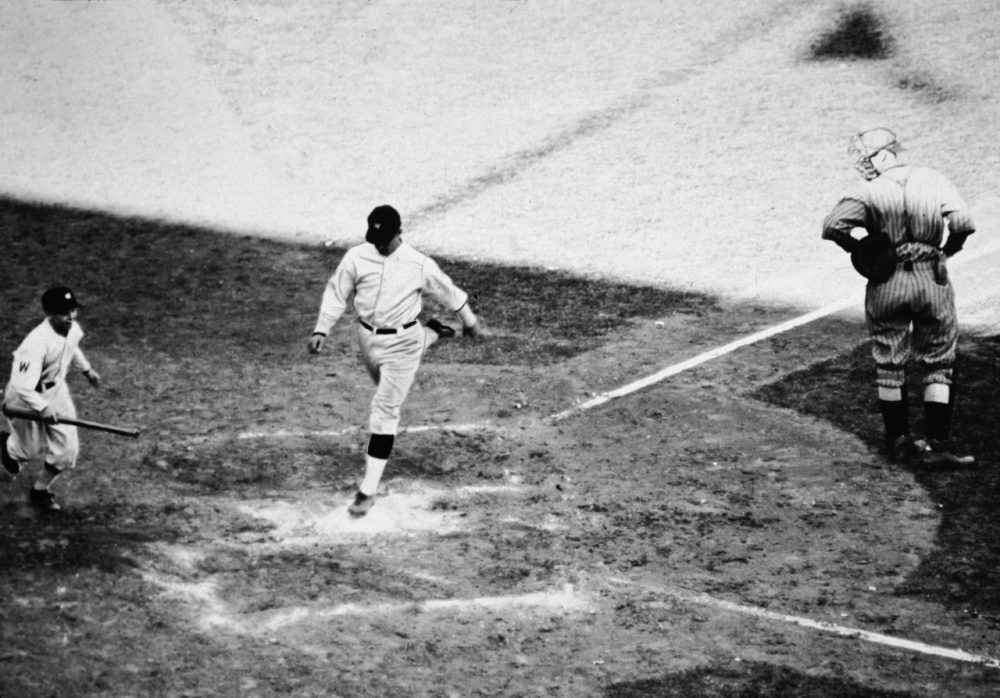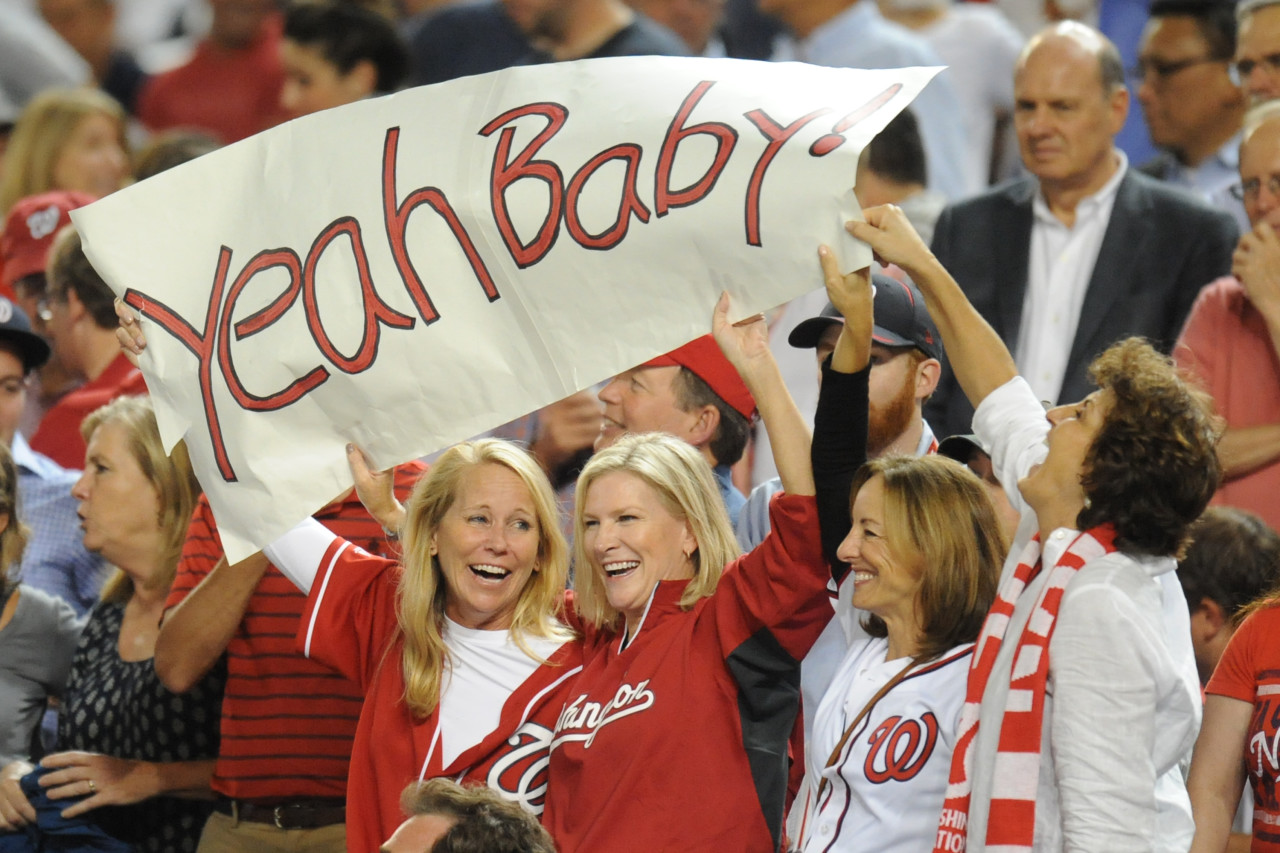Advertisement
1924: When Washington Ruled Baseball
Resume
Barring a monstrous collapse, the Washington Nationals are going to finish first in the NL East. For baseball fans, the Nationals are a relatively new phenomenon — it's only been nine years the Montreal Expos relocated to D.C. and changed names -- but it's not the first time a baseball team was all the rage in the nation's capital. It also happened 90 years ago.
Fred Frommer wrote book about the history of Washington baseball and his story, “The Last Time America Rooted For Washington,” appeared in Politico Magazine.
BL: The year was 1924. The Washington Senators were contending for the American League pennant, and a headline in the Washington Evening Star proclaimed, "Disease in Epidemic Form." What were the symptoms of that case of pennant fever?
[sidebar title="The Controversy Over The Babe's First Blast" width="630" align="right"]Two cities claim to be the site of Babe Ruth's first home run. Reporter Andrew Norton studied the mystery for Only A Game.[/sidebar]
FF: Well, the fans in Washington went just completely crazy for their Washington Senators, also known as the Nationals back then. They would congregate around office buildings in the pouring rain and watch updates from the team on the road. When the team was doing well they would wait outside train stations to gather around and celebrate their conquering heroes. So it was a very exciting time in Washington baseball.
BL: I was surprised to learn that in 1924 fans displayed their enthusiasm by throwing their hats and coats onto the field. I wonder if anybody ever thought better of it, climbed down out of the stands and asked, "Can I have my coat back?"
FF: You got to wonder how many people lost their coats or hats, their umbrellas, for that matter. All kinds of things. I guess, you know, you get caught up in the excitement and you don't think about it too much.
BL: You discovered that Washington had fans in lots of other ballparks as well. When the Senators played in Boston, "the crowd stood up and cheered every time they scored." Was this just because if the Senators won the pennant the Yankees wouldn't have it?
FF: That was one factor. I think people were already turned off to the Yankees, especially in Boston but even nationwide. But there’s also a national following for the team that transcends any kind of rivalry, and that's because [future Hall of Famer] Walter Johnson was at the end of his career at that point — had never had a chance to pitch in a World Series — and fans across the country really wanted this nice guy to finally get a chance to do that.
And also the Senators had never won anything before. They had several straight losing seasons going into that year — had never won a pennant — and fans kind of wanted to root for this underdog. And a third factor is the last three World Series had been the New York Yankees vs. New York Giants. And believe it or not, even back then people were kind of sick of New York and all its powers.
BL: Bucky Harris, the Senators' 27-year-old player-manager, told his team before a western trip — which back then, as you note, meant a visit to Cleveland, Detroit, Chicago and St. Louis — "Let's not make any enemies.... Let's beat 'em, but treat 'em nice." Tell us a little bit about Harris' importance to the club.
[Sports writers] thought there's no way a young guy like that could help this team. But [owner Clark] Griffith saw something in this young guy.
Fred Frommer on Bucky Harris
So, the team started off pretty slowly. They were about a .500 team through 50 games, but then, as Babe Ruth actually said, Washington caught fire quicker than any team he had ever seen. And they caught fire basically from June on until the end of the season.
BL: The pennant race, as you described it, was tight enough, but the tension during the World Series must have been extraordinary. Walter Johnson took two losses during that series and then, well, you tell us about that seventh game.
[sidebar title="Lou Gehrig's 'Luckiest Man' Speech 75 Years Later" width="630" align="right"]We look at the power, subtlety and complex history of Gehrig's famous speech delivered at Yankee Stadium in 1939.[/sidebar]FF: The seventh game was quite exciting. It’s in Washington. And the Senators came back from a two-run deficit to tie the game in the eighth inning, and Johnson had already — as you noted — lost two starts and he didn’t have any starts scheduled from then on, so he said he was probably going to retire. And it looked like he was going to go down as a two-time loser.
Well, in the ninth inning, tie game, they needed someone to come in, and they bring in Walter Johnson. And Johnson gave up a triple with one out in the ninth inning and was very close to actually becoming a three-time loser. He wriggled out of that.
And then the game went into extra innings and for three straight innings he let the leadoff guy reach base, which most fans know is a real baseball no-no, and it often leads to a run being scored. Somehow he was able to get out of that. And finally in the bottom of the 12th inning the Senators won the game on a bad hop ground ball that went over the third baseman’s head.
BL: The losing pitcher in that game, Jack Bentley, had beaten Johnson in Game 5. And after the seventh game, Bentley said, "The good Lord just couldn't bear to see a fine fellow like Walter Johnson lose again." I wonder if there's any contemporary pitcher who would be moved to a sentiment like that?
FF: Things are way too competitive nowadays. I can't imagine a pitcher ever saying anything like that. Certainly athletes often invoke God but they don’t usually invoke God rooting for the other team.

BL: You had written a good deal about the Nationals before the article that we've been discussing. Do you have a sense of what a triumph by the current Washington team would mean in D.C.?
FF: You know I think would it would mean quite a bit. You know the political establishment really rallied around this team in 2012, the last time they won a division title. And it was the kind of thing where, and I talked to both Harry Reid and Mitch McConnell — the majority and minority leader in the Senate, respectively — and both of them told me that, you know, this is the one thing that they were able to talk about without getting close to blows.
The Nationals united politicians like them and others. Not just politicians but pundits, columnists, the intelligentsia of Washington and everyday fans. So I think it would really mean a lot to Washington if they were to finally get across that hump for the first time in 90 years.
More:
This segment aired on September 13, 2014.